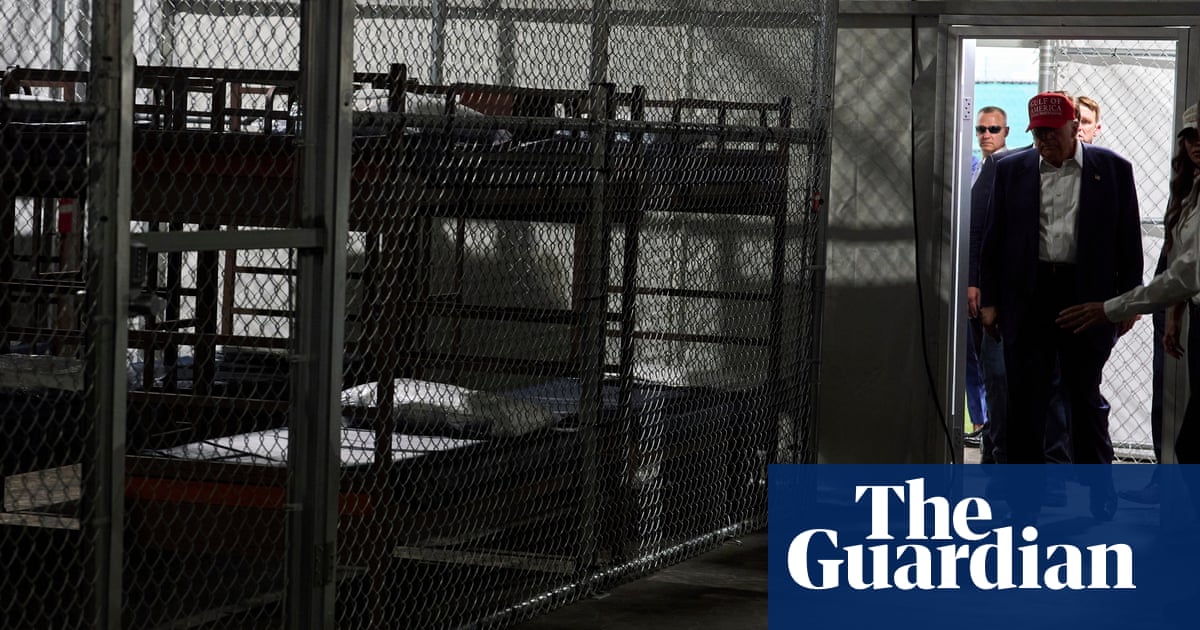Mockery Amidst Misery: The Controversial 'Alligator Alcatraz' Detention Center

In a striking juxtaposition of cruelty and commercialism, as the first detainees were being ushered into the controversial migrant detention facility dubbed 'Alligator Alcatraz' in the humid wetlands of the Florida Everglades last week, supporters of Donald Trump were engaging in a peculiar form of retail therapy. The official social media account of the Florida Republican Party took to X (formerly Twitter) to promote a new line of merchandise themed around this grim facility. “Surrounded by swamps & pythons, it’s a one-way ticket to regret,” the post exclaimed, encouraging followers to “Grab our merch to support tough-on-crime borders! Limited supply – get yours before the gators do!”
This blatant mockery and exploitation of a dire humanitarian issue is part of a broader trend in Florida, which has seen a significant escalation in anti-immigrant measures under the leadership of Governor Ron DeSantis. Those who have closely observed the state’s aggressive policies towards migrants are not surprised by this latest development. They recall past incidents, such as when DeSantis infamously used taxpayer funds to orchestrate a deceptive flight that lured Venezuelan migrants from Texas to Massachusetts with false promises of jobs and housing, only to abandon them upon arrival. Following that stunt, he even launched a line of merchandise branded as “DeSantis Airlines – bringing the border to you,” which further underscores this troubling trend.
Maxwell Frost, a Democratic congressman from Florida, condemned this behavior, articulating the fundamental cruelty of the situation. He stated, “Again, it proves that cruelty was always the point.” Frost highlighted the horrific conditions detainees are expected to face, mentioning the extreme temperatures that can reach between 90°F to 100°F daily, coupled with the looming threat of hurricanes. Just as Trump and DeSantis were showcasing the facility, a standard Florida rainstorm led to flooding, demonstrating the precariousness of the situation. “The hats, the facility, the press conferences, and media interviews – this is all one fun, cruel, disgusting game to them,” he continued. “To treat people like animals, like they’re less than, because they were not born in this country. They don’t care about the human lives they will harm and potentially kill because of their actions.”
Observers noted that Trump's high-profile visit, which included a tour of the facility alongside DeSantis and Homeland Security Secretary Kristi Noem, epitomized a prioritization of theatrics over substantive policy. Michael Binder, a political science professor at the University of North Florida, commented, “This is Donald Trump 101. Come up with a catchy phrase and market the heck out of the merch.” He further explained that while the center may be operational, the emphasis appears to be largely on the political optics rather than effective immigration policy. He expressed concern about the potential disasters that could arise from such facilities, drawing parallels to the federal government's inadequate response to Hurricane Katrina. “What happens if something goes wrong at one of these camps?” he questioned. “They’re built presumably with aluminum pipes and some tarps. This is Florida, right? We get hurricanes. If you have a hurricane run through there, I think it’s gone.”
Despite the potential ramifications, neither Trump nor DeSantis seem particularly concerned about future fallout. As they focus on enacting the most stringent conditions for immigrant detainees, both politicians are nearing the end of their current terms in office. For DeSantis, however, his strong support of Trump's immigration agenda and the rapid development of 'Alligator Alcatraz' could be strategic moves to maintain relevance as he eyes a potential presidential run in 2028, despite a lackluster showing in the 2024 race. “Keeping his name in the press, in the media, around an issue that his base thinks is important, is certainly useful to that end,” Binder remarked.
Opposition to this facility is mounting from a coalition of immigration advocates, environmental organizations, and Native American tribes including the Miccosukee and Seminole. They argue that the rapid construction of this detention center, which state officials claim could accommodate up to 5,000 detainees and 1,000 staff, poses significant risks to both the local community and the delicate ecosystem of the wetlands. Melissa Abdo, the Sun Coast regional director for the National Parks Conservation Association, raised alarms about the extensive environmental damage that would result from such a large-scale operation, noting that it would require massive logistical changes to the area, including the transport of food, water, and waste. She pointed out the vulnerability of the only evacuation route, a single two-lane highway currently undergoing construction, which could spell disaster in case of a hurricane.
Representative Frost echoed these concerns, emphasizing the troubling implications of the camp’s isolated location. He stated, “For people like Trump, DeSantis, and Noem, this is a sick game of hunting, kidnapping, harming, and discarding human beings.” He concluded, “It was never about helping Americans or putting our country first. What we’re seeing is pure hatred and disdain for human beings because of the color of their skin and where they were born.”


















